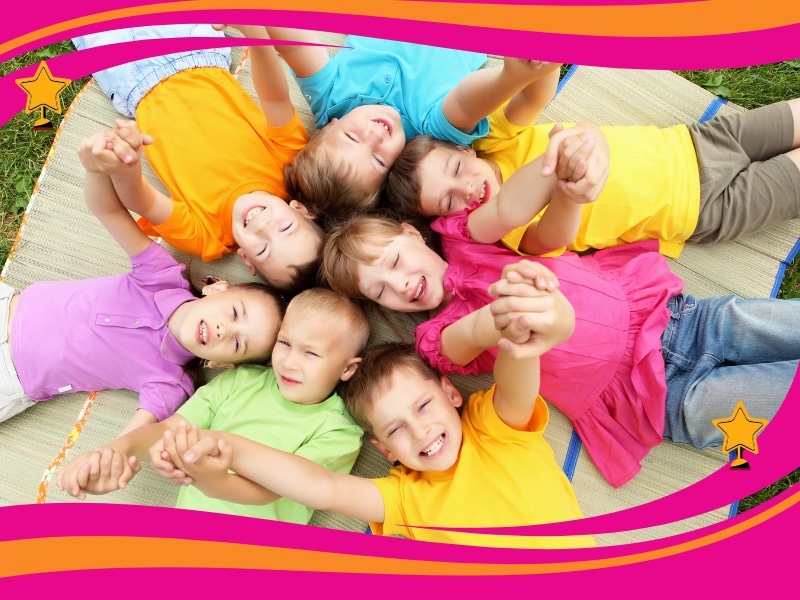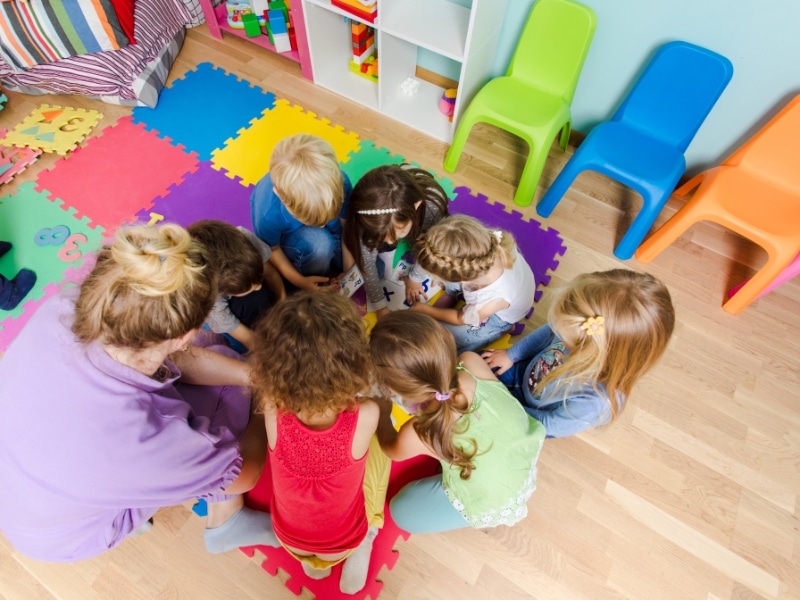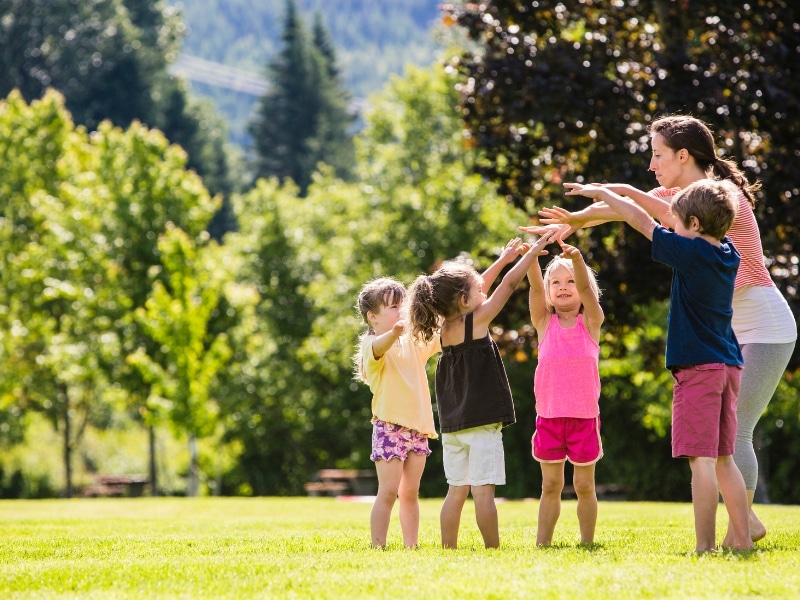Which Games Promote Teamwork Among Kids?

Teamwork is a skill kids begin to learn at a young age, often through playful interactions and structured activities. While individual play is essential for developing personal skills, group games teach kids to work together, share, and communicate effectively. In child development, especially in programs, teamwork-focused games allow kids to build trust, develop empathy, and acquire social skills critical to their growth.
Why Is Teamwork Important in Early Childhood Development?
In early childhood, teamwork provides the foundation for many critical life skills. The importance of early childhood education lies in its ability to shape foundational skills, from social interaction to cognitive development, setting children up for lifelong success. Here’s why teamwork is essential:
- Builds Communication Skills: Through teamwork, children learn to express ideas, ask questions, and understand others’ perspectives.
- Encourages Patience: Taking turns and waiting for instructions helps kids practice patience.
- Promotes Problem-Solving: In team settings, kids encounter challenges and work together to find solutions.
- Develops Empathy: Kids start recognising and understanding emotions by interacting with peers, fostering empathy.
- Enhances Cooperation: Collaborative games encourage kids to share, cooperate, and rely on one another to achieve goals.
What Group Outdoor Games Help Kids Learn Teamwork?
Outdoor games offer excellent opportunities for kids to practice teamwork in an active setting. Here are a few popular choices:
- Treasure Hunts: Kids work in teams to find hidden objects, encouraging problem-solving and collaboration.
- Relay Races: These races help kids understand the importance of timing, patience, and passing responsibilities.
- Parachute Games: Children hold onto a giant parachute and work together to lift, move, or bounce objects, which builds coordination and teamwork.
- Tag Variants: Team-based versions of tags, like freeze tags, allow kids to strategise and work together to “unfreeze” team members.
- Obstacle Courses: Kids support each other to complete the course, learning to cheer each other on and offer assistance where needed.
Which Creative Activities Build Teamwork Among Young Learners?
Creative activities are ideal for nurturing both imagination and cooperation. These activities allow kids to express themselves while learning to work with others:
- Group Art Projects: Creating murals or collages encourages kids to blend their ideas into one cohesive masterpiece.
- Puppet Shows: Kids can craft a story and perform together, learning to listen, take turns, and contribute to a shared goal.
- Building Forts: Using blankets, pillows, and imagination, kids work together to construct a fort, learning to share and problem-solve.
- Storytime with Group Participation: Collaborative storytelling lets kids add to a story, building on one another’s ideas.
- Role-Playing Games: Acting out scenarios as a group helps kids explore different roles and perspectives, enhancing empathy and cooperation.

Can Building Blocks and Construction Games Promote Teamwork?
Building games are exceptional for teaching young learners about planning, teamwork, and the joy of creating something together. Here’s how:
- Lego or Building Block Towers: Kids take turns adding blocks to build a structure, learning patience and trust.
- Bridge Building: Kids work together to build a bridge using blocks or other materials, encouraging problem-solving and strategic thinking.
- Jigsaw Puzzles: Solving a puzzle together encourages communication and allows kids to see the value in different perspectives.
- Building a Marble Run: Working together to create a track for marbles helps kids practice engineering and collaborative skills.
- Sandcastle Creations: When playing with sand, kids can develop sandcastles, which allows them to experiment and problem-solve as a team.
How Can Music and Dance Games Strengthen Team Skills in Kids?
Music and movement games are fun ways to foster teamwork and build confidence among young learners. Here’s how they contribute to teamwork:
- Follow the Leader Dance: One child leads the group in dance moves, teaching others to follow and take turns leading.
- Musical Chairs: Although competitive, this game teaches kids about fairness and respecting rules within a team environment.
- Rhythm Games: Clapping games or passing instruments in rhythm requires listening and synchronisation, helping kids work as a unit.
- Freeze Dance: Kids dance and freeze together, creating a fun environment for teamwork and self-expression.
- Instrumental Play: In a “band” setup, each child plays a different instrument, learning to listen and contribute to the harmony.
How Can Daycare Programs Support Teamwork Skills in Young Children?
Daycare programs play an essential role in nurturing teamwork among children. Choosing the best childcare for your child’s future is a crucial decision that can significantly impact their early development and lifelong learning. Here are some ways they foster these skills:

- Promoting Inclusive Play: Encouraging kids of different backgrounds to play together fosters unity and understanding.
- Implementing Reward-Based Systems: Recognising team efforts motivates kids to value collaboration.
- Guided Role Assignments: Assigning roles in group activities teaches responsibility and highlights the importance of every role within a team.
- Incorporating Reflective Discussions: After a group activity, discussing what went well and what didn’t helps kids learn from their experiences.
- Creating Structured Group Activities: Teachers design activities that require children to work in groups, making collaboration necessary. Furthermore, daycare nurtures social and emotional growth by providing children with a supportive environment to build friendships, learn empathy, and develop essential communication skills.
What Role Do Teachers Play in Facilitating Teamwork Games?
Teachers are essential in creating environments where kids can explore teamwork and learn through games. Their roles include:
- Encouraging Positive Reinforcement: Teachers praise teamwork, reinforcing that cooperation is valued.
- Modelling Cooperative Behaviour: Teachers set an example for kids by demonstrating teamwork.
- Setting Clear Expectations: Providing simple game instructions and goals helps kids understand what’s expected.
- Guiding Conflict Resolution: Teachers can mediate and teach kids to resolve issues respectfully when conflicts arise.
- Facilitating Reflection: After each activity, teachers guide children in reflecting on their roles, contributions, and areas for improvement.
How Can Parents Encourage Teamwork Outside of Preschool?
Parents play a vital role in reinforcing teamwork skills at home. Here are a few ways they can support teamwork outside of preschool:
- Hosting Playdates with Group Games: Simple games like board games or puzzles encourage kids to work together in a fun, low-stress environment.
- Encouraging Family Projects: Activities like gardening or cooking as a family create bonding moments and teach cooperation.
- Introducing Team Sports: Enrolling kids in team sports helps them learn about commitment and the roles individuals play within a team.
- Creating “Helping Tasks”: Assigning household tasks that require teamwork, like setting the table or sorting laundry, helps kids learn responsibility.
- Reading Stories About Teamwork: Books with themes of collaboration and friendship reinforce teamwork lessons through storytelling.
Where Can You Find Daycare Programs That Foster Teamwork in Children?
Suppose you’re looking for the best preschool programs for teamwork development. Innocent Minds offers enriching environments for young learners. We focus on supporting children’s social, cognitive, and physical development through thoughtfully crafted teamwork activities. From group games and creative arts to music and movement sessions, we nurture a strong sense of community, equipping children with essential skills that will benefit them for a lifetime. Reach out to Innocent Minds for personalised childcare solutions that support your child’s unique growth and development.
